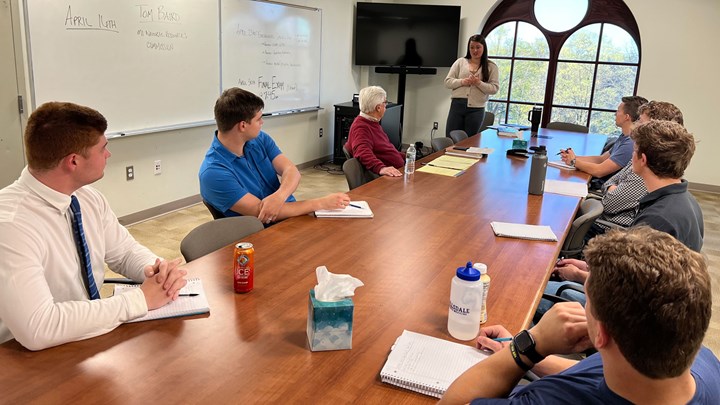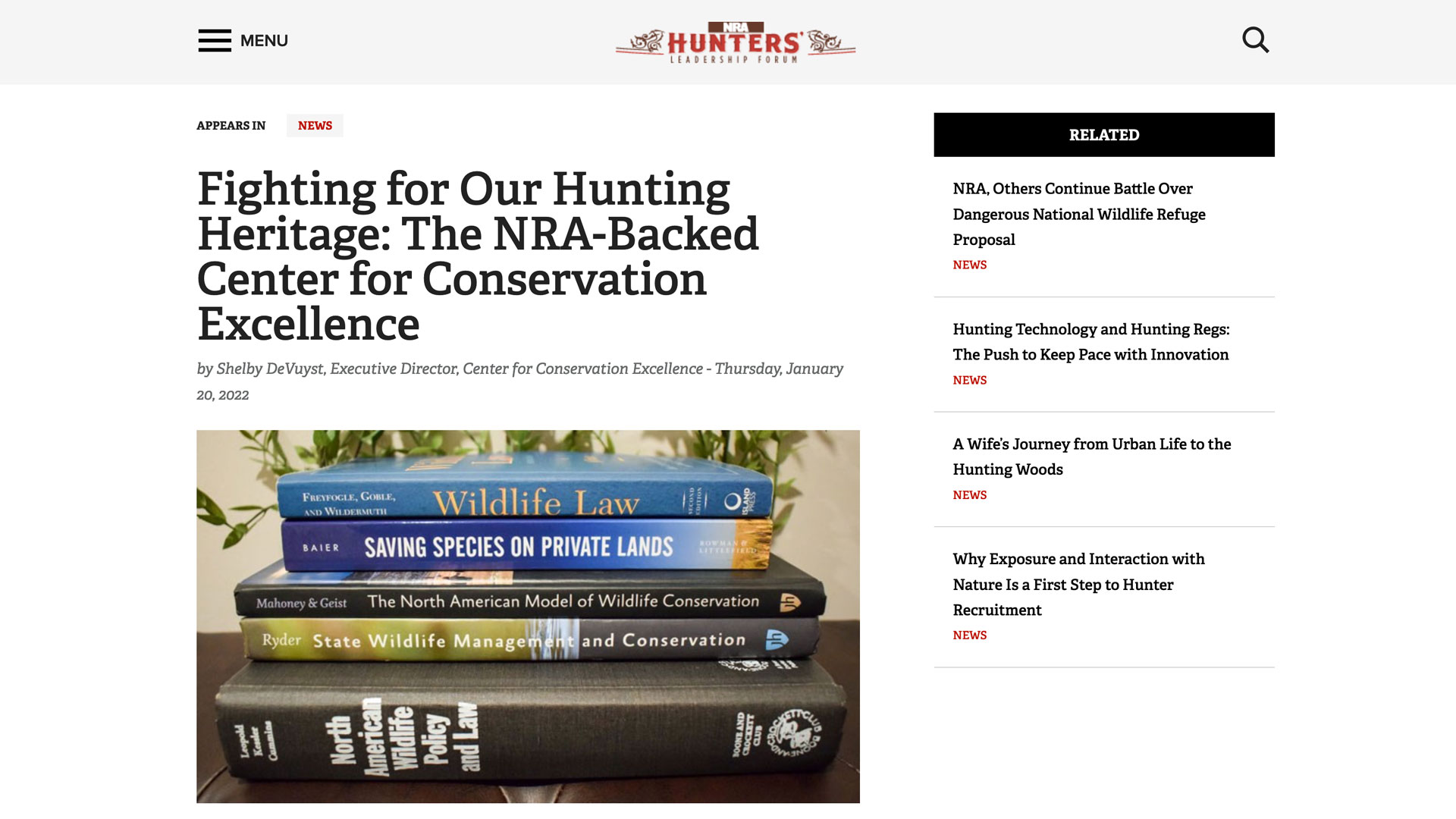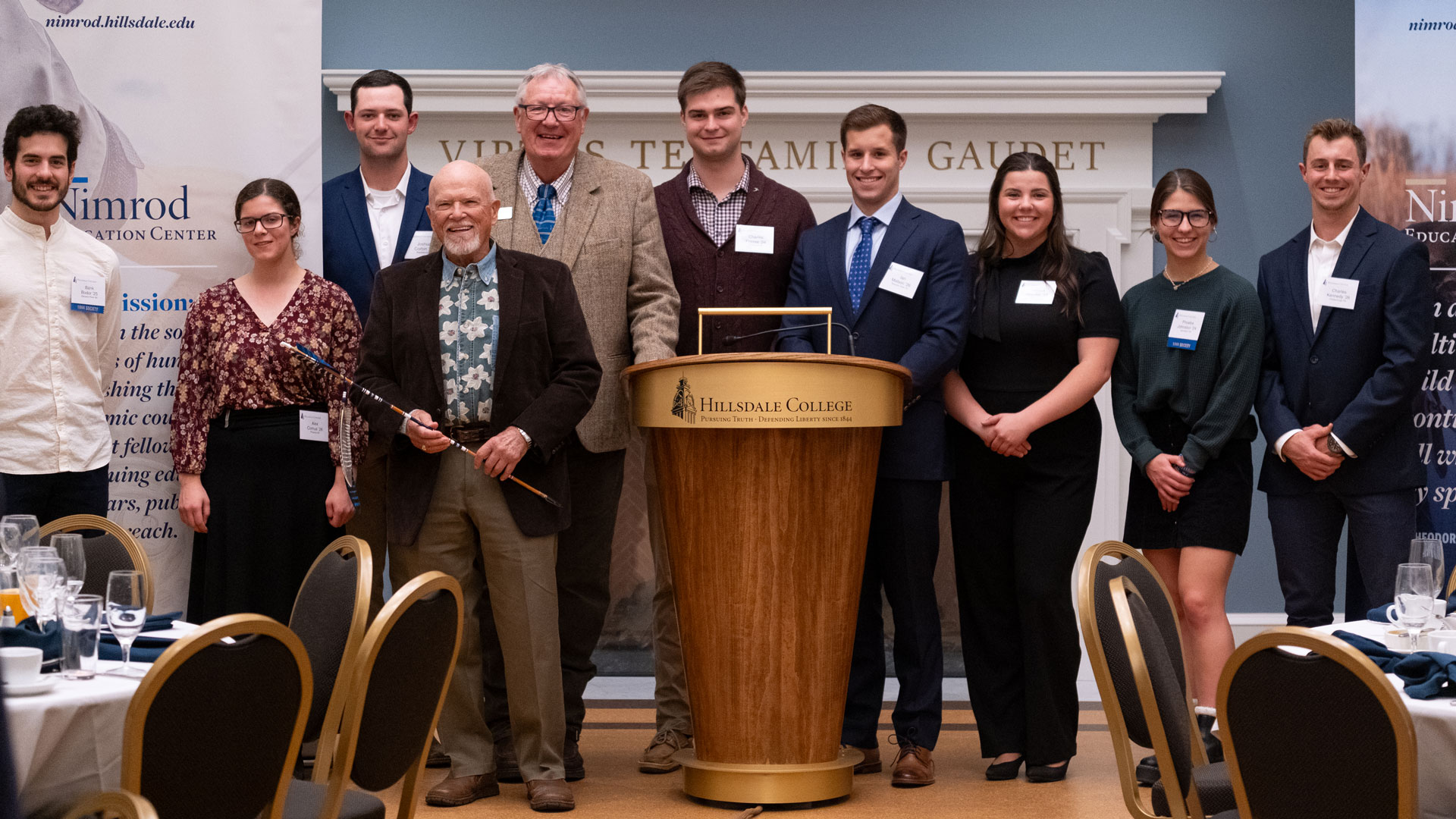
by Mike Arnold - Monday, May 13, 2024

Pictured above: Hillsdale College Professor Shelby LaButte's wildlife law courses, in part, go far in promoting positive public perceptions of hunters and legal, regulated hunting.
Hillsdale College and the Nimrod Education Center (NEC) are unique, and the two together add up to much more than the sum of their separate parts. In genetics, we call it epistasis when two genes act on each other in a way that the product produced is much greater than 1 + 1 = 2. The depth of intellectual ability and character form the basis of the Hillsdale College “DNA.” Combining that DNA with the NEC’s vision of training the next generation of scholars to be influencers of policy and public opinion favoring hunters and shooters produces graduates who are mature, self-confident and gracious. This combination would be powerful for any group trying to affect societal change, and for sportsmen and -women these students represent a formidable opportunity for communicating the role of conservation through hunting, in particular. Communicating this role is the first step in affecting decisions in state and federal legislatures, and courts of law, in support of hunters’ rights.
As part of the NEC’s mission to promote hunting and fishing, students are invited to apply for a competitive one-year Nimrod Fellowship. A key element in the preparation of the NEC “Fellows” alongside other Hillsdale undergraduates, for leadership roles in business, law, politics and science rests with professors and staff passionate about training the next generation for the challenges facing hunters and shooters. Specifically, these educators and administrators provide the students, in classes and on fieldtrips, with the necessary information and experiences that reinforce the message that without funds generated by hunting and shooting, there would be no conservation of wild places or wildlife in the United States. Though easily understandable on its surface, this message is falling on stony ground in many parts of our country, needing careful and continual tending for it to reach its maximum effectiveness in changing the minds and hearts of non-hunters.
There are many faculty members and staff contributing to the larger-than-expected potential generated by the classroom and outdoor activities of the NEC. Four of the most important are the NEC founder and benefactor Alan Taylor; the NEC Director and Professor Alan Stewart; the boots-on-the-ground facilitator, Morgan Morrison, who also serves as an associate business director at Hillsdale College; and Professor Shelby LaButte who, in addition to instructing at Hillsdale, applies her law degree while overseeing the National Wild Turkey Federation’s (NWTF) NRA-backed Conservation Law Program.

Of the various courses taken by the Nimrod Fellows, along with their non-Nimrod peers, Wildlife Law I is foundational for those wishing to understand the role of hunting in conservation. Using the text, North American Wildlife Policy and Law, published by the Boone and Crocket Club, students learn from professors Shelby LaButte and Alan Stewart, everything from relevant legal terminology to the primary significance of land and wildlife placed into a public trust. Though some of the students registering for Wildlife Law I pursue a biology degree at Hillsdale, they are in the minority. Polling students over the three semesters of Wildlife Law I revealed the majority are following degrees in Politics, Financial Management, Political Economy, Economics, Biochemistry, Applied Mathematics and Physics. This diversity of degrees is thrilling, indicating the training of future politicians, business leaders, teachers and academics for a wide array of positions across our culture and country. The types of potential professions represent those with elevated stature and visibility; these are the characteristics of platforms of major influencers. Such influencers, armed (pun intended) with the knowledge and experience in wildlife conservation, reflect a potent well-spring of new leadership who support the hunting lifestyle, and who will be able to clearly, and with confidence and grace, explain its central role in North American conservation efforts.

NEC founder Alan Taylor (front row, holding an arrow presented to him by Hillsdale College's Nimrod Center) and NEC Director Alan Stewart (row 2, second from left) meet regularly with Hillsdale College's eight Nimrod Fellows.
Though the course focus is on the North American Model of Wildlife Conservation (NAMWC), as the title of the textbook used in Wildlife Law I suggests, there are chapters covering models of conservation through hunting in other parts of the world. In fact, on my recent visit to Hillsdale College and the NEC, my presentation in Wildlife Law I covered material on an African model of conservation, specifically that seen in the Mozambique hunting concession, Coutada 11, operated by Zambeze Delta Safaris.
One means of understanding the uniqueness of the “Hillsdale + Nimrod” association is by examining the professional path of the primary lecturer in Wildlife Law I. Shelby LaButte is a young woman driven by her passion for the outdoors, hunting, fishing, educating and the law. Her email signature line reflects well this multiplicity of roles; it reads, “Conservation Law Attorney & Educator.” Wearing her lawyer hat, she expressed in a recent Zoom meeting that legal arguments and rulings by those not aware of U.S. conservation law, specifically the fact that the NAMWC rests on funds derived from hunting and shooting, are a frightening aspect of current culture. She argues that conservation efforts suffer from such a lack of understanding, and/or when lawyers, judges and the general public rest their legal decisions or for whom they vote on the messages of animal rights extremist groups such as PETA.
LaButte’s academic history reflects her passion for the outdoors. She first earned an undergraduate degree in Environmental Sciences from the University of Michigan. Mentioning an epiphany while at U of M, LaButte grinned and stated, “I realized that I had the brains for law school.” When quizzed on her goals from a law degree, she quickly pointed out that she pursued her passion rather than money. “I never wanted a job in a firm where I worked 80 hours a week on briefs concerning real estate, etc. I went to Michigan State University where I could study wildlife law and how energy development affects conservation. When I finished, I had a concentration in conservation law. From there, I approached the eminent conservation law professor, Carol Frampton, asking if I could work as an intern with her. She told me that I could work part-time, providing a test run of how committed I was, and how well I would function in the area of wildlife law.”
The rest of the story in LaButte’s development is clear. She now acts as a legal guardian for the NWTF, and as instructor and mentor to Hillsdale undergraduates, including Fellows of the NEC. It was difficult to arrange a meeting, even over Zoom, with Professor LaButte, not because she was being obstructive, but because she is in constant demand for presentations and advice. In fact, she replied to my greeting on the Zoom call with, “I apologize if I give unclear answers. I just returned from the University of Tennessee—Knoxville, where I am trying to encourage the law school to introduce courses on wildlife policy and law.”
LaButte is not one to sit on her metaphorical, or actual laurels. Recently she gained approval for Advanced Wildlife Law at Hillsdale, in which she will take students from the Wildlife Law I course who learned the “why” of hunting and shooting based conservation, through various, real-life how-to examples. That is not where her instructional efforts end, however, with the syllabus for another Hillsdale course on energy development and its effects on wildlife conservation about 50 percent complete.
Needless to say, Hillsdale College, the Nimrod Education Center and its Fellows—and tireless workers such as Shelby LaButte—hold the promise for effective changes in public perceptions of hunters and shooters. I wait with baited breath to watch this next generation of leaders as they communicate the message of conservation writ large that rests on the dedication of passionate sportsmen and women.
E-mail your comments/questions about this site to:
[email protected]
Proudly supported by The NRA Foundation and Friends of NRA fundraising.
